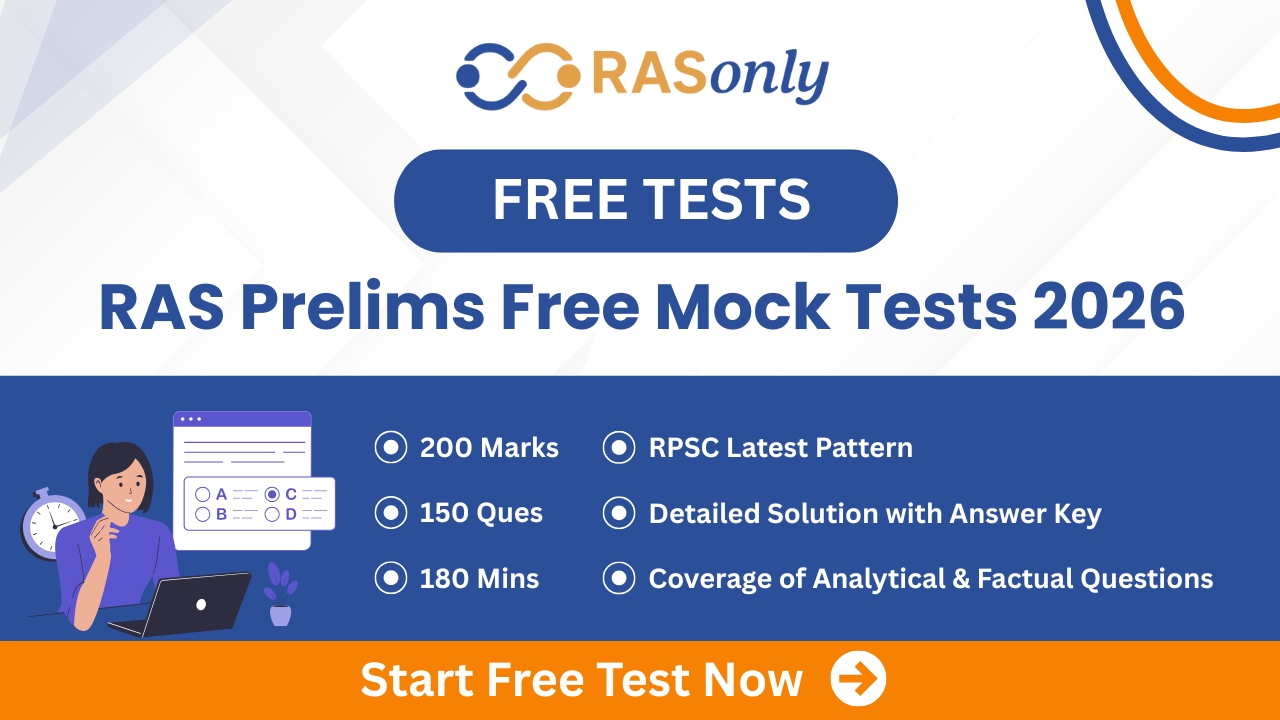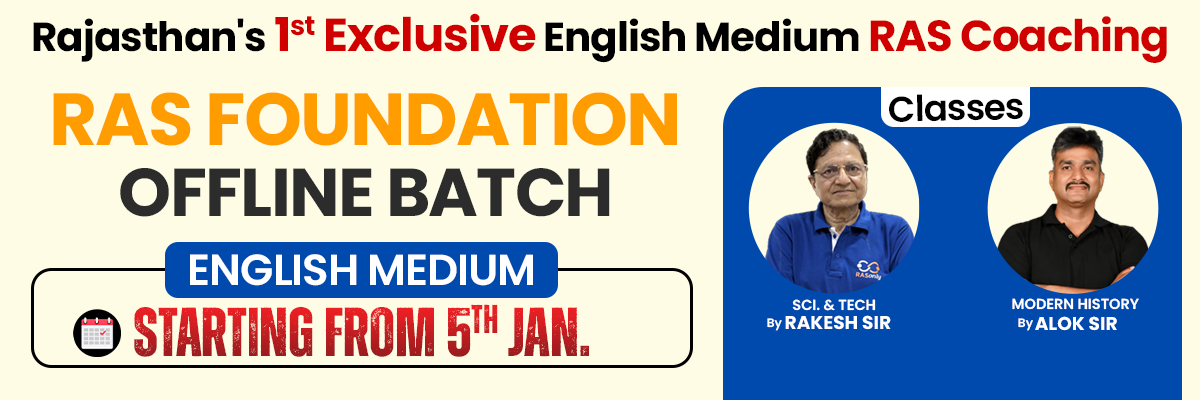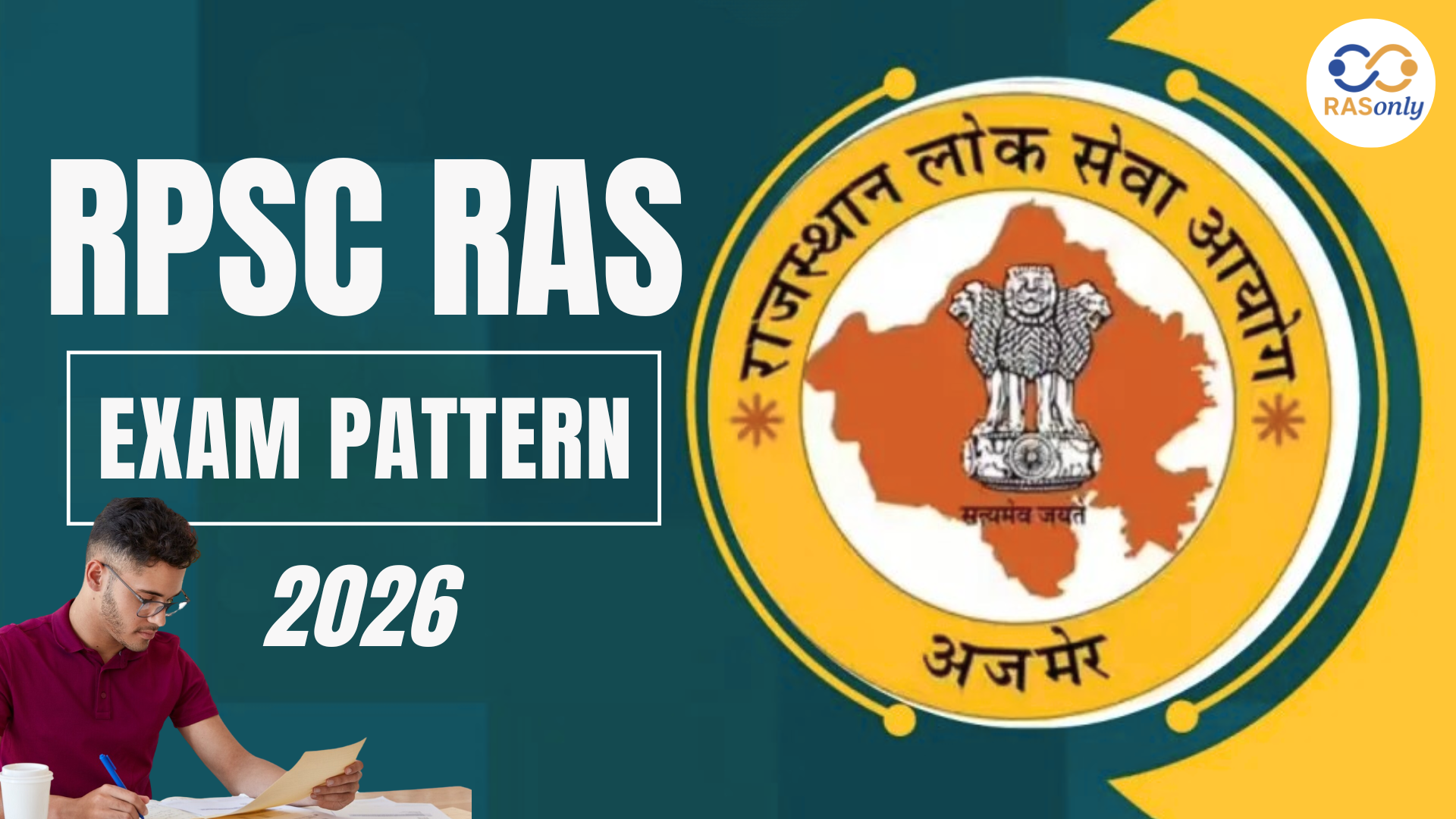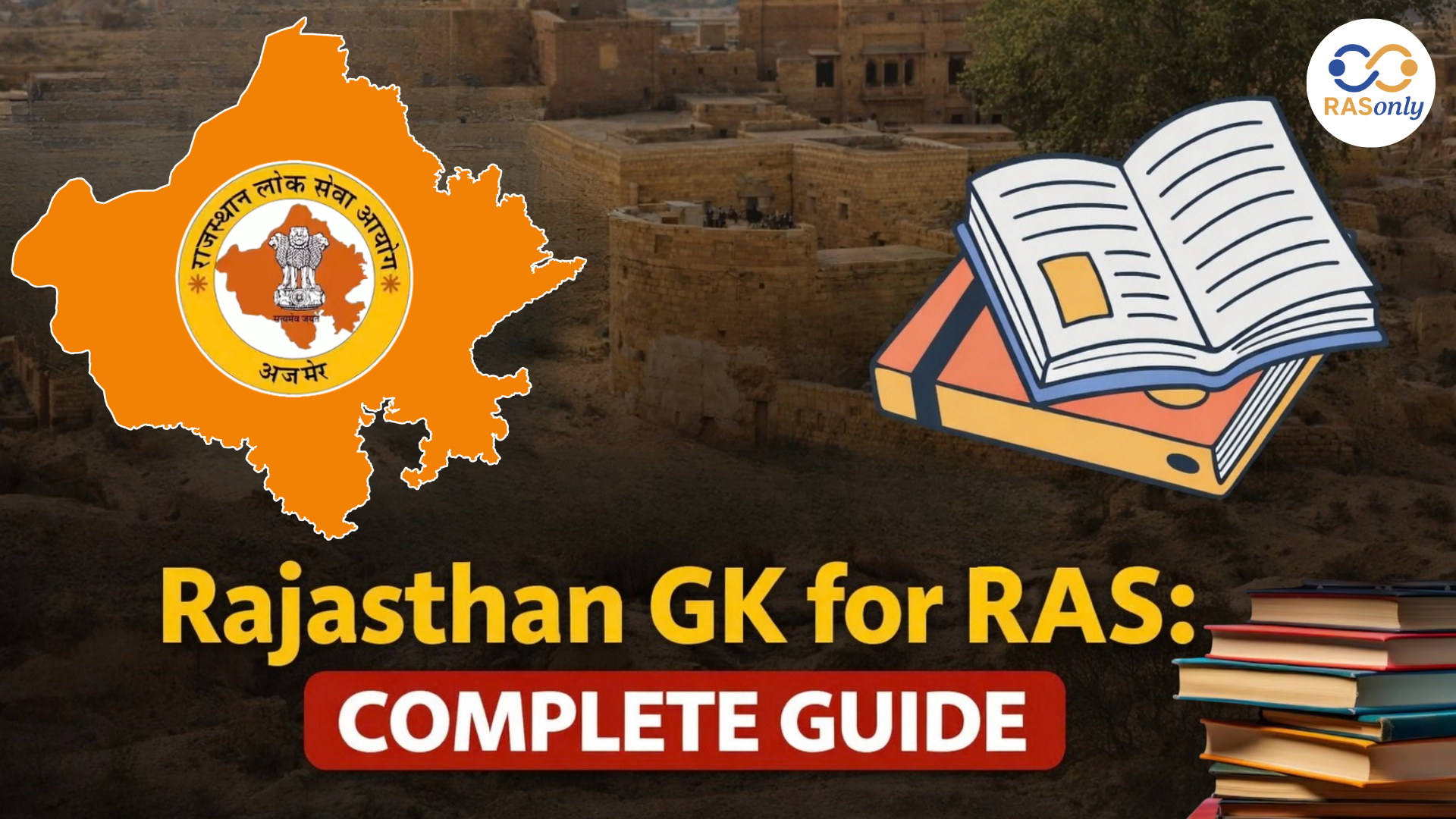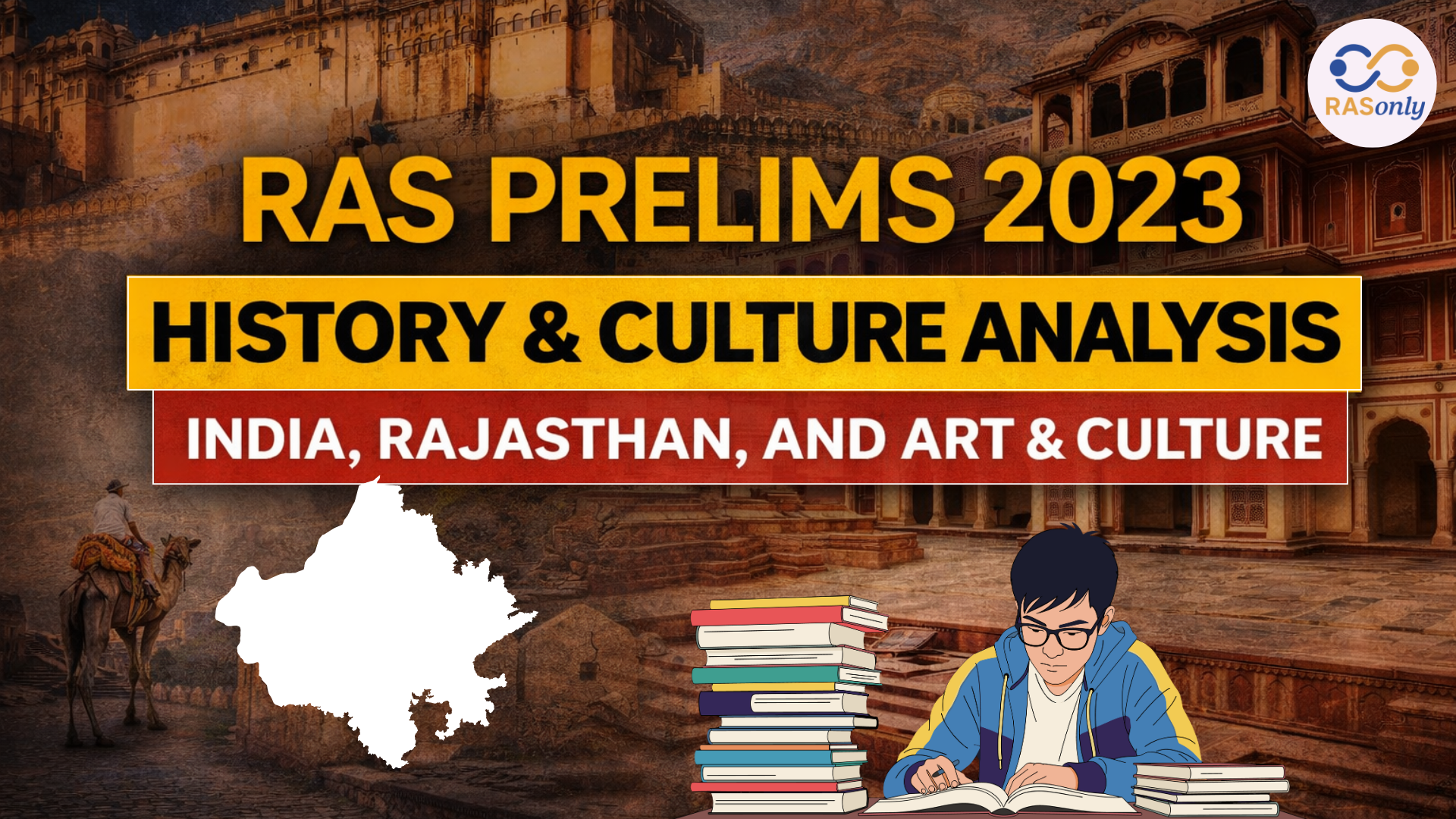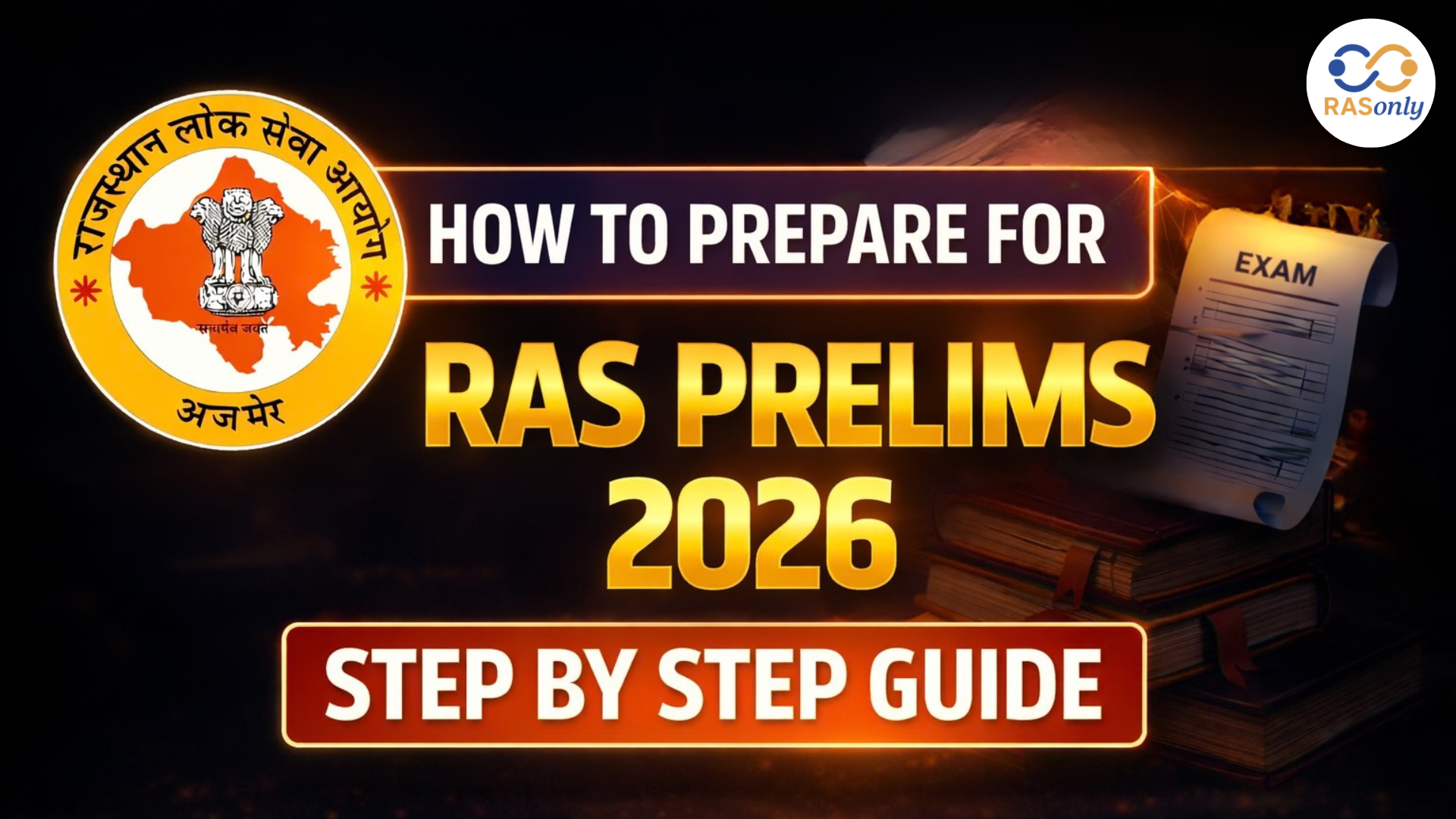RPSC RAS 2026 Subject Wise Exam Pattern for Prelims, Mains & Interview Details
- >
- RAS Preparation Resources
- >
- Top Government Education Schemes in India 2025: Overview & Benefits
Top Government Education Schemes in India 2025: Overview & Benefits

Get in Touch with RASonly!

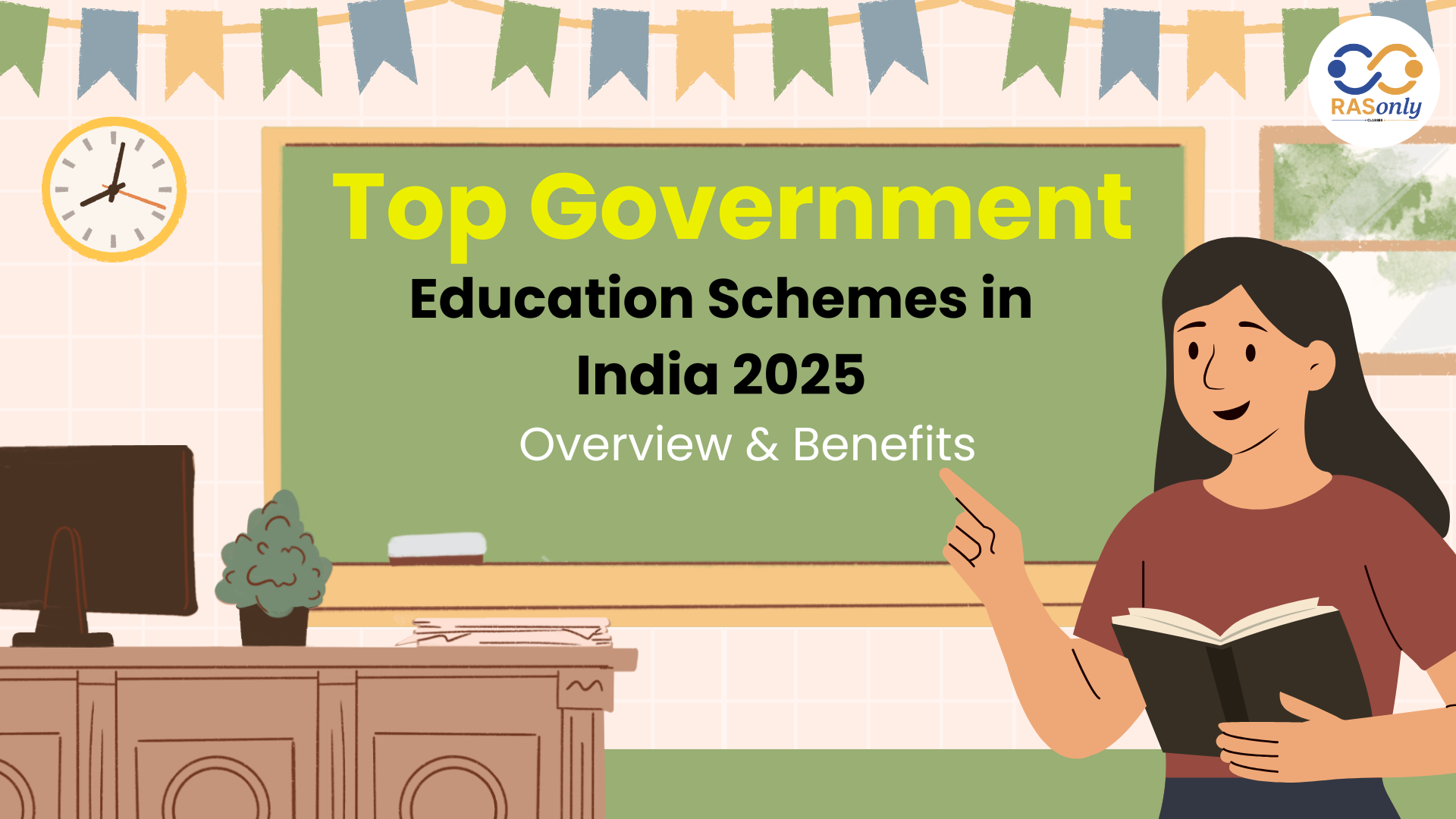
Top Government Education Schemes in India are critical to the transformation of the learning ecosystem in the country, which means making it accessible to everyone, every child, and of high quality. These schemes, in terms of focus, are access, digital empowerment, foundational literacy, nutrition, and vocational training goals of the National Education Policy (NEP) 2020. These schemes start at school levels to adult education with the objective to fill the educational gaps, upgrade the infrastructure, and prepare a generation that is ready to face the future, both in rural and urban India.
NEP 2020: Framework Behind Top Government Education Schemes in India
The National Education Policy (NEP) 2020 has a profound impact on the Top Government Education Schemes of India, as the blueprint of the educational reformation has been called such. NEP 2020 focuses on all-around development, conceptual learning, the development of skills, and going digital. It replaces the conventional 10+2 framework with a new 5+3+3+4 model, in the hope of making education more learner and future-oriented. PM SHRI, Samagra Shiksha, and NIPUN Bharat (along with all the other principal plans) are built to achieve one of the visions of NEP, which is to provide an inclusive and equitable learning experience.
- Shift from 10+2 to 5+3+3+4 school structure
- Focus on Early Childhood Care & Education (ECCE)
- Promotion of multilingualism and mother tongue-based learning
- Integration of vocational training from Grade 6 onward
- Emphasis on foundational literacy and numeracy (FLN)
- Use of technology and digital learning platforms
- Inclusive education with a gender and social equity focus
- Encouragement of critical thinking and experiential learning
Samagra Shiksha Abhiyan: Flagship Among the Top Government Education Schemes in India
Samagra Shiksha Abhiyan is one of the Top Government Education schemes in India and is a holistic and converged program to develop school education in pre-primary, primary, upper primary, and senior secondary levels. It was launched in 2018 and unifies three major schemes, SSA, RMSA, and Teacher Education, to provide continuity, sustainability, efficiency, and inclusive learning outcomes. The plan focuses on access, equity, quality, and the use of technology, which is closely aligned with the objectives of NEP 2020. It contributes to digital classrooms, vocational training, and infrastructure development in government schools as well.
- Covers education from pre-primary to Class 12 under one umbrella
- Focus on inclusive education for girls, SC/ST, and differently-abled children
- Promotes ICT-enabled learning, digital classrooms, and smart schools
- Strengthens teacher training through DIKSHA and NISHTHA platforms
- Provides grants for school infrastructure, libraries, sports, and labs
- Encourages community engagement and school-based assessments
- Funds vocational education and skill development in secondary schools
- Monitored by UDISE+ and Shagun Portal for transparency and performance tracking
PM SHRI Schools: NEP-Aligned Model Under Top Government Education Schemes in India
The Top Government Education Schemes in India include PM SHRI (Pradhan Mantri Schools for Rising India), which was launched in 2022 and is an outstanding reform whose main aim is to illustrate the practical realization of NEP 2020. These schools are exemplary schools with double infrastructure, technology-empowered learning, and environmentally friendly operations. More than 14,500 schools are being built in India to establish standards of quality education, equity, and innovation. PM SHRI schools are not only enhancing academic educational outcomes but also holistic, value-based, and skill-oriented education.
- Selection of 14,500+ schools across India to be transformed into NEP-aligned models
- Emphasis on digital classrooms, smart boards, and ICT labs
- Integration of experiential and competency-based learning methods
- Sustainable practices like solar power, rainwater harvesting, and green campuses
- An inclusive and joyful learning environment with a focus on child well-being
- Strong school leadership and capacity-building programs for teachers
- Regular assessment of learning outcomes and school performance
- Promotes multilingual education and Indian knowledge systems
PM POSHAN Scheme: Nutrition-Based Support in Top Government Education Schemes in India
The PM POSHAN Scheme, also known as the Mid-Day Meal Scheme, is considered to be an essential portion of the Top Government Education Schemes in India to better the health of the students and improve their learning process. It offers healthy food to more than 11 crore children in government-aided and government schools in classes 1-8. The scheme is important in enrolling more children in school, minimizing cases of school dropout, and facilitating social equality. With the alignment to NEP 2020, PM POSHAN also focuses on School nutrition gardens, sourcing locally, and engaging the community.
- Provides hot cooked meals to students from Class 1 to 8 in government and aided schools
- Covers over 11.8 crore children across 11.2 lakh schools nationwide
- Enhances classroom attendance, retention, and concentration levels
- Promotes nutrition awareness and combats malnourishment among school children
- Introduction of School Nutrition Gardens and Tithi Bhojan concept
- Emphasis on the use of fortified foods and adherence to nutritional norms
- Encourages participation from community members and local authorities
- Digital monitoring system for real-time tracking and transparency
NIPUN Bharat: Foundational Literacy Focus in Top Government Education Schemes in India
The Top Government Education Schemes in India, with NIPUN Bharat Mission (National Initiative for Proficiency in Reading with Understanding and Numeracy) being the key component, the focus will be on encompassing foundational learning among students of Grades 1 to 3. Introduced as part of Samagra Shiksha in 2021, its major objective is to make sure that all children become literate and numerate by the time they complete Grade 3 by 2026-27. With a strong belief that basic learning is the gateway to a successful academic life, the scheme applies play-based learning, assessments, and digital resources, enhancing early education reforms.
- Targets foundational literacy and numeracy (FLN) for students in Classes 1 to 3
- National goal: FLN proficiency for all children by 2026–27
- Implemented through Samagra Shiksha with support from states and UTs
- Child-centric and play-based pedagogical approaches
- Uses tools like FLN Index, student tracking, and regular learning assessments
- Teacher training programs via the NISHTHA-FLN platform
- Focus on multilingual teaching and inclusive classroom practices
- Strengthens parental and community engagement in early learning
ULLAS (New Literacy Mission): Adult Learning in Top Government Education Schemes in India
ULLAS (Understanding Lifelong Learning All in Society) is India's flagship adult education and lifelong education programme reconstituted under NEP 2020. Unique Learning Ladders with Skills (ULLAS) is a part of Top Government Education Schemes in India, and through volunteerism and technology-aided learning, the project targets to provide at least 5 crore adults with literacy skills by the year 2027. It targets low literacy, numeracy, digital literacy, financial literacy, and constitutional values. The program also has the benefit of not only teaching children but also adults, which enables the latter to be more consequential members of the economy and civil society.
- Targets adult learners aged 15 and above with basic literacy and life skills
- Goal: Achieve 100% adult literacy by 2027
- Covers five key components: Foundational Literacy & Numeracy, Critical Life Skills, Basic Education, Vocational Skills, and Continuing Education
- Implemented in a hybrid mode via mobile apps and community learning centres
- Uses the ULLAS app for learner registration, course content, and volunteer tracking
- Encourages youth volunteers, NGOs, and social workers to participate
- Special focus on marginalized sections, including women and rural populations
- Supports digital and financial literacy for improved livelihoods
Vocational Training & Skilling: A Growing Need in Top Government Education Schemes in India
Vocational education is also one of the Top Government Education Schemes in India, part of the new vision of NEP 2020 to start early skills development. The government is also introducing vocational subjects taught since Class 6, which will allow students to gain specific skills to become employable and entrepreneurs. Under Samagra Shiksha, these programs are carried out in collaboration with Sector Skill Councils and industry partners, contributing to closing the education-job market gap. These markets are in IT, agriculture, retail, tourism, and healthcare.
- Vocational subjects introduced from Class 6 under the NEP 2020 framework
- Skill-based education implemented in 8,000+ schools across India
- Covers trades like IT, retail, agriculture, hospitality, beauty & wellness
- Collaboration with NSDC, Sector Skill Councils, and industry partners
- Career guidance and soft skill development through school programs
- Focus on experiential learning and hands-on training modules
- Opportunities for internships and apprenticeships in senior secondary classes
- Alignment with Skill India and Atmanirbhar Bharat goals
Budget Allocation & Impact of Top Government Education Schemes in India
Budgetary allocation is important in effecting the Top Government Educational Schemes in India successfully. The Government of India has served the education sector with 1.25 lakh crore rupees in the Union Budget 2025-26, and 78,572 crore rupees was allocated in school education. There were major boosts to flagship programs, such as Samagra Shiksha, PM POSHAN, PM SHRI, and NIPUN Bharat, to achieve greater extensiveness and quality. This allocation is useful in filling infrastructure backlogs, increasing access to digital means, and teacher training, or enhancing learning outcomes across both urban and rural India.
- ₹78,572 crore allocated to school education in Union Budget 2025–26
- 60% of the Ministry of Education’s budget is directed toward key school-level schemes
- Samagra Shiksha received a major share for infrastructure and equity initiatives
- PM POSHAN funds increased to improve meal quality and school nutrition gardens
- Expansion of PM SHRI Schools backed by budget for tech upgrades and smart classrooms
- Increased funding for teacher training and foundational learning under NIPUN Bharat
- Investment in digital tools and ICT labs to support blended learning
- Positive trends in enrollment, retention, and girl-child education across states
Conclusion
The Top Government Education Schemes in India are bringing a change in the education system by ensuring that it becomes more inclusive and skill-based as well as future-ready. These programs go across the board, in the form of basic literacy, online/digital classrooms, and vocational education, which act as enablers of the NEP 2020 vision. The effect is evident in the various regions with more funding and technological incorporation. Nevertheless, it is important that it is implemented on time, that it is monitored regularly, and that the community is involved. Innovation and partnership will continue to ensure that the dream of accessible quality education by 2030 is accomplished.
FAQs
Post Category
- RAS Salary
- Result
- RAS Admit Card
- RAS Job
- RAS Cutoff
- Preparation Tips
- RAS Answer Key
- RAS Exam Analysis
- RAS Syllabus
- RAS Previous Year Papers
- RPSC RAS Exam Pattern
- RAS Interview
- RAS Mains Exam Date
- RAS Vacancy
- RAS Test Series
- RAS Best Books
- RAS Preparation Resources
- RAS Coaching Centre
- History
- Polity
- Geography
- Economics
- Science
- Art and Culture
- RPSC RAS Application Form
- RPSC RAS Notification
RASonly Interview Guidance Program

Mr. Ashok Jain
Ex-Chief Secretary Govt of Rajasthan
- IAS officer of the 1981 batch, Rajasthan cadre.
- Passionate about mentoring the next generation of RAS officers with real-world insights.
- Got retired in Dec 2017 from the post of Chief Secretary of the state of Rajasthan.

Mr. Guru Charan Rai
Ex-ASP / SP in Jaisalmer
- Guru Charan Rai, IPS (Retd), retired as Inspector General of Police (Security), Rajasthan, Jaipur in 2017.
- Served as ASP and SP in Jaisalmer, Nagaur, Sri Ganganagar, Sawai Madhopur, Dausa, Sikar, and Karauli.
- He also held key positions as DIGP and IGP in the Law and Order division.

Mr. Rakesh Verma
Ex-IAS Officer, B.Tech, MBA, and M.A. (Economics)
- IAS officer of the 1981 batch and retired in Chief Secretary Rank.
- Civil servant of high repute and vast experience.
- Has been teaching UPSC CSE subjects for the last six years.
Related Post
Daily Current Affairs for RAS Exam Preparation 2026
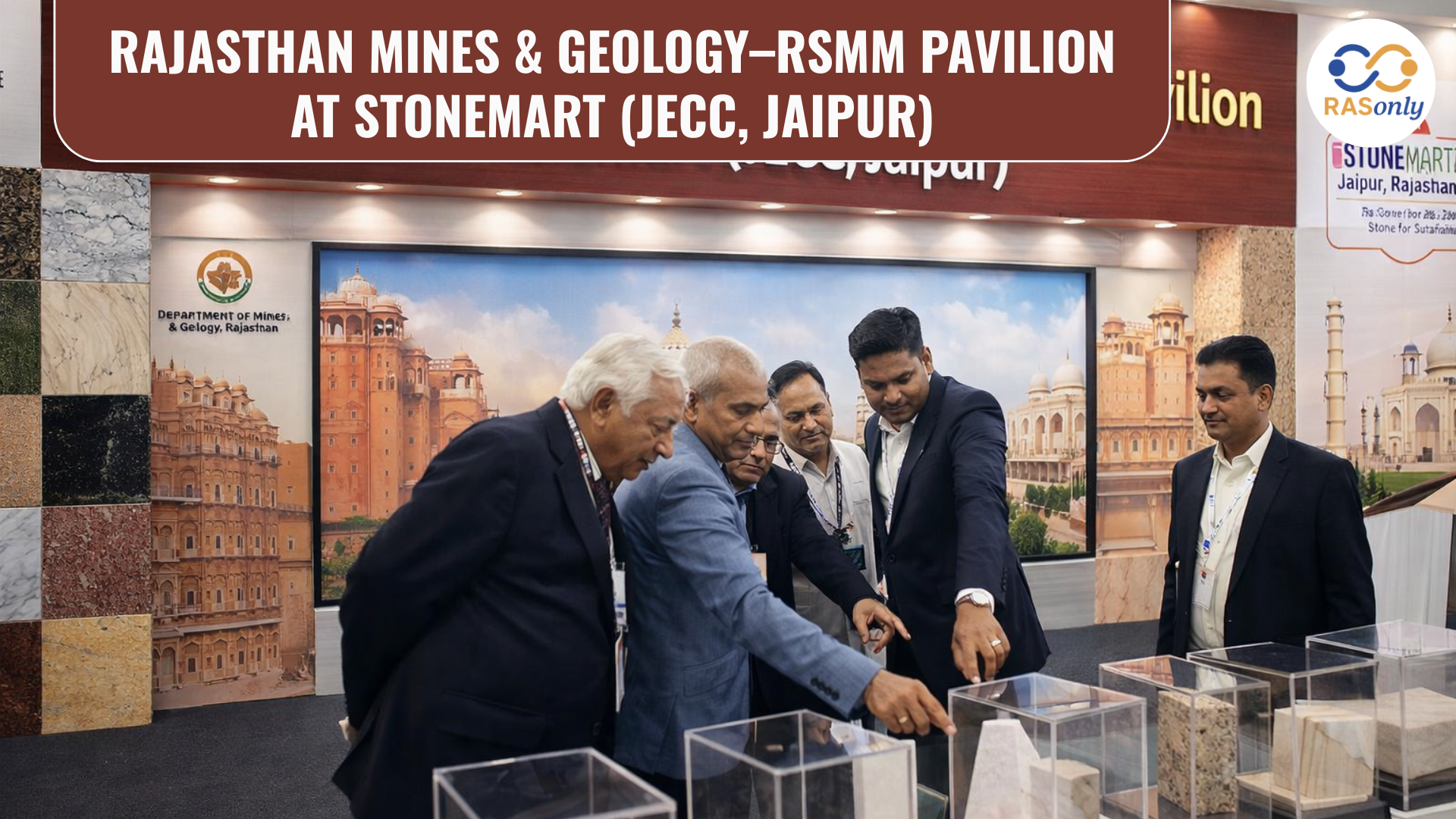
Rajasthan Pavilion Shines at Stone Mart Jaipur 2026
February 07, 2026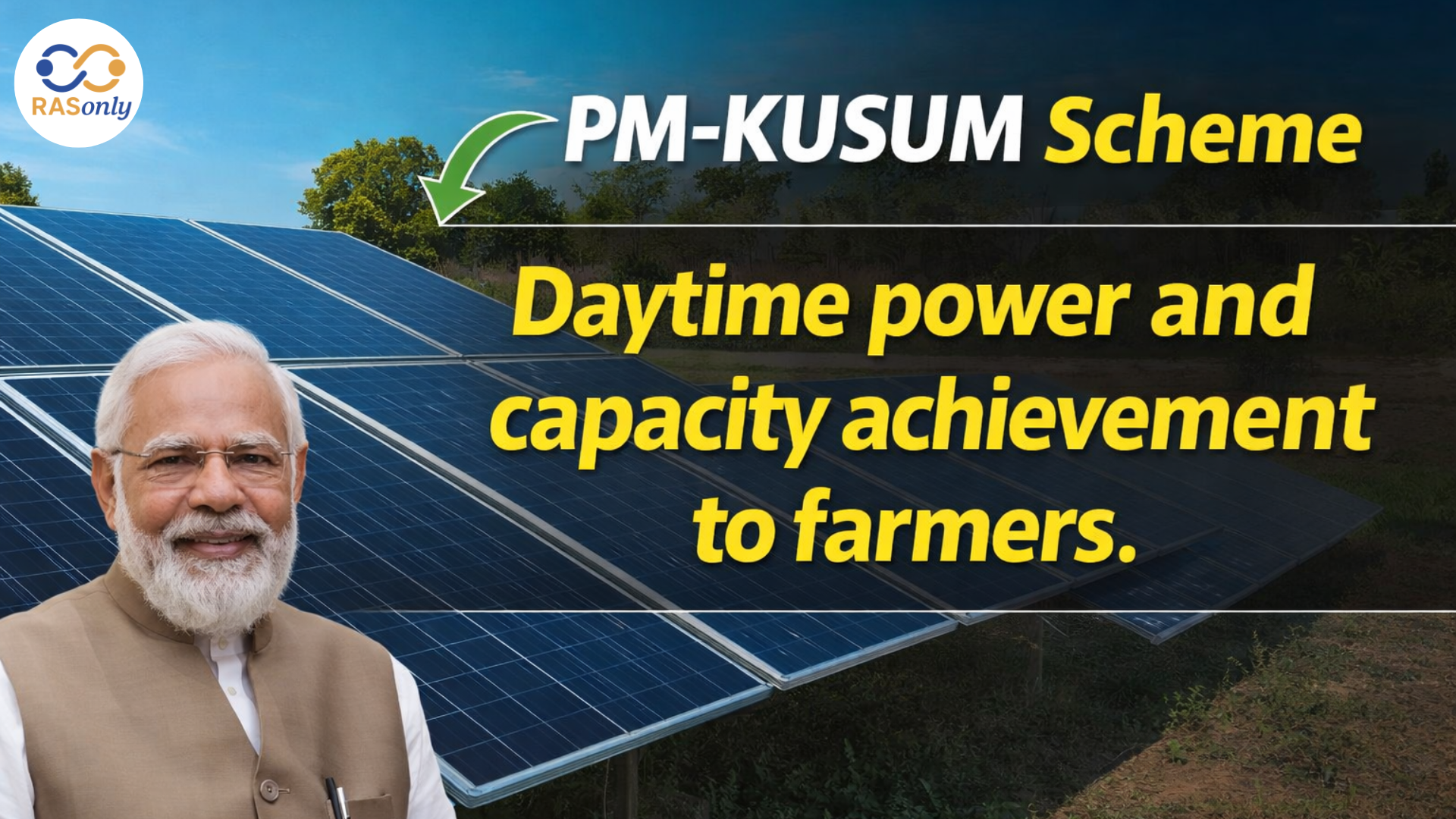
Rajasthan Achieves 3,000 MW Under PM-KUSUM Scheme
February 07, 2026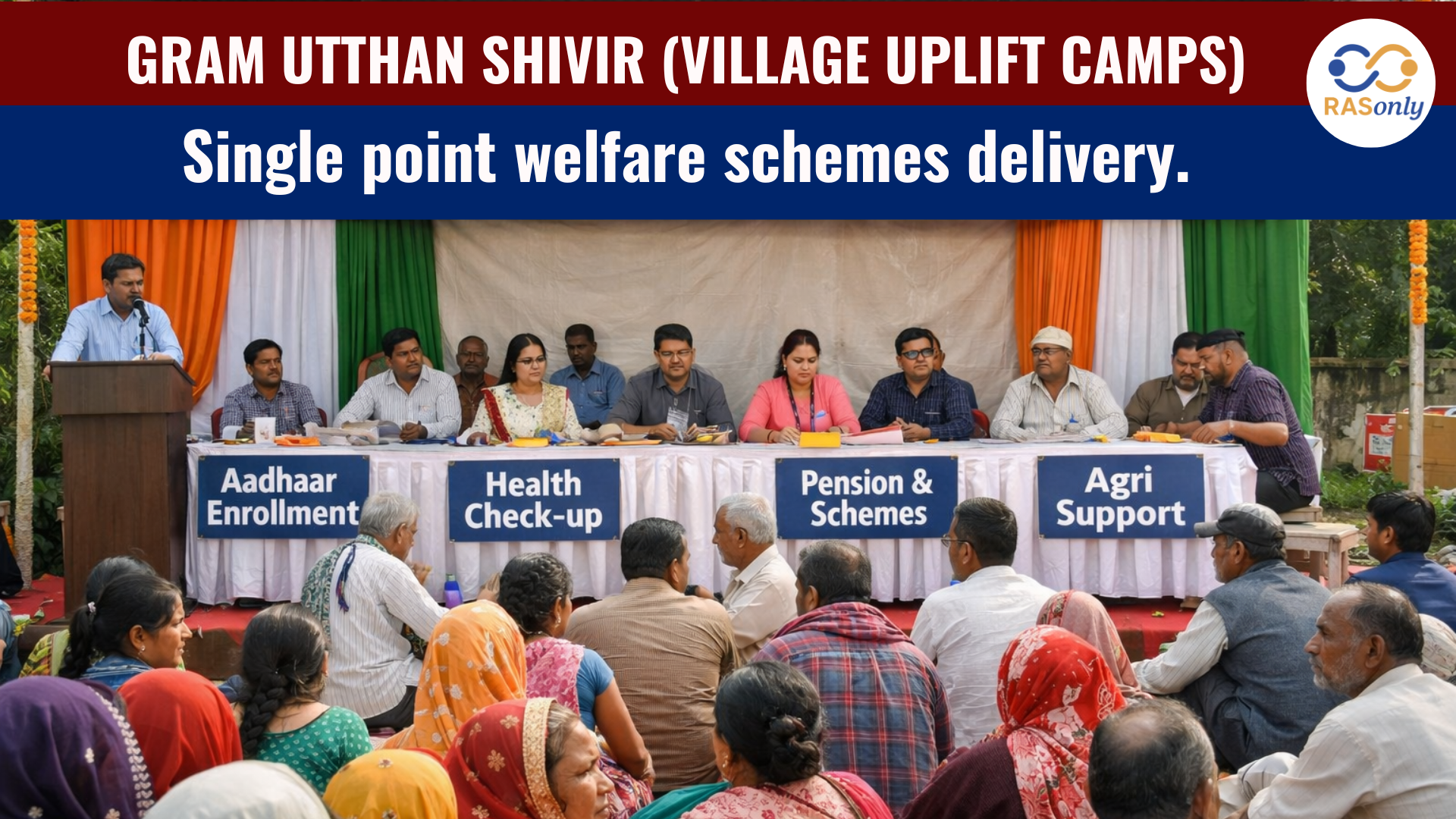
Gram Utthan Shivirs Strengthen Rural Governance in Rajasthan
February 07, 2026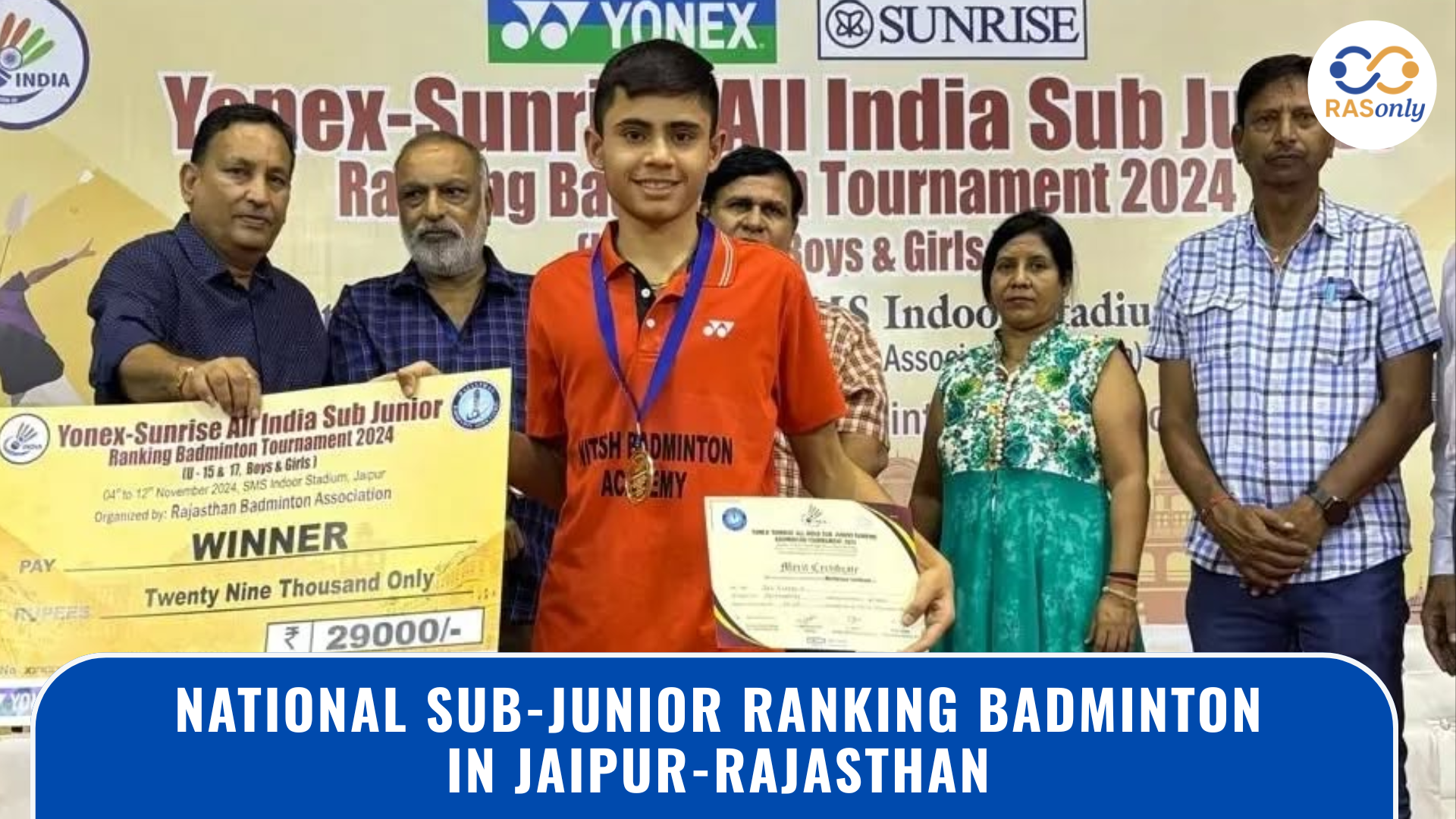
Jaipur Badminton: 72-Minute U-15 Final Creates Record
February 06, 2026👉🏻 Register Today to Join Classes! 👍🏻
- Team RASOnly -
🎯 Benefits of RASOnly Coaching:
- ✅ 1:1 Mentorship with RAS Officers
- ✅ Experienced and Expert Faculty
- ✅ Free Library Access
- ✅ Daily Minimum 4 Hours Must
- ✅ Comprehensive Study Material
- ✅ Regular Tests & Performance Analysis
- ✅ Personalized Guidance & Doubt Solving
- ✅ Online & Offline Class Options
- ✅ Affordable Fees with Quality Education
Key Highlights:
- 👉🏻 3-Day Refund Policy
- 👉🏻 New Batch Starting from 04 August
- 👉🏻 Registration Amount: Only ₹1000

